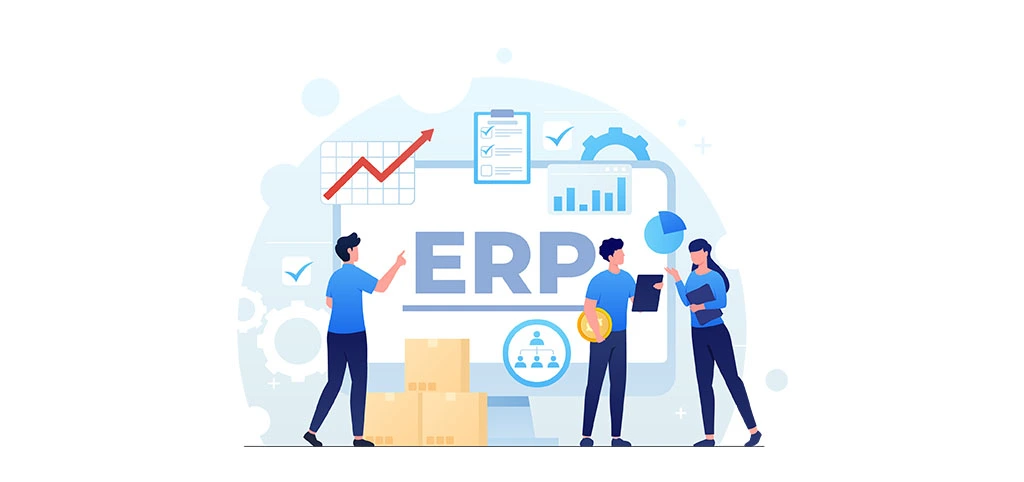Think you’d be a good fit for our team?
ERP Software Development
Company in Kerala
Ideenkreise Technologies, the leading ERP software development company in Kochi, can assist you in witnessing tangible improvements in your business.

Benefits of ERP Software Development Services
Deciding whether your business should adopt ERP software can be a challenging decision, especially if it’s your first time integrating advanced software. You may think that operating without ERP software is feasible, but if you aspire to witness a significant transformation in your business and achieve comprehensive efficiency, it’s essential to consider the advantages you’ll gain from implementing this software.
Gaining a Competitive Edge
While ERP software indeed necessitates a substantial investment, the cost of not investing can be even more significant. While some companies may choose to stick with traditional methods, others explore technological solutions to gain a competitive advantage.
Enhanced Operational Efficiency
An ERP platform streamlines repetitive and tedious processes, significantly reducing the need for manual data entry. This not only boosts user productivity but also eliminates the risk of inaccurate data, which could lead to costly business errors.
Accurate Predictive Analysis
ERP software development services provide users, particularly managers, with the tools needed to generate more precise forecasts. This empowers software users and businesses to plan effectively for their future needs.
Cross-Department Collaboration
With data centralized and accessible through your ERP system, there's no reason why different departments can't collaborate, sharing information and working together whenever necessary.
Seamless Data Integration
ERP software serves as a central repository for all the essential information that your company and its various departments require to manage daily business operations and services efficiently.
Cost Savings
By consolidating real-time data from a single source, ERP software reduces administrative and compliance costs, allowing businesses to allocate funds to other critical areas of operation.
We embrace challenges
enthusiastically.
Given the constantly evolving technology landscape and shifting consumer behaviors, along with the growing complexity of the internet and its users, the realm of content is in a perpetual state of change. This necessitates our readiness to tackle challenges when it comes to marketing in these dynamic scenarios.
Adaptable Models
Our custom CMS development service offers the flexibility to adapt to ever-evolving business needs seamlessly.
Transparency
Transparency is the core principle of our CMS approach, and we adhere to it rigorously. Effective communication and involving key stakeholders from the outset ensure that we maintain complete transparency throughout the project.
Punctual Sprint Execution
We understand the value of time and the urgency to help your business thrive and outshine competitors. To facilitate this, we organize CMS development in well-structured phases, providing real-time progress updates.
Structured CMS Reporting
Mapping your journey to success with structured CMS development service reporting keeps us agile and simplifies the process of making necessary adjustments.
Streamlined Processes
Python is an extensible language, allowing you to write Python code in C or C++ and compile it into C/C++ code seamlessly.
Why Opt for Ideenkreise?
Choosing Ideenkreise provides you with access to the best ERP software development services in India. We specialize in combining innovation, creativity, and coding expertise to deliver exceptional, business-focused results. Whether you need a superb website built from scratch or wish to hire developers from India, with Ideenkreise Technologies, you will receive the right solution for your requirements.
Satisfied Clients
Our extensive clientele spans across various countries, attesting to our software development firm’s stellar reputation in the industry. We’re known for our agile approach and on-time project deliveries, with an unwavering commitment to transparency in our custom software development processes.
Successful Project Deliveries
Since our establishment, we’ve successfully completed numerous projects, thanks to the dedicated efforts of our 50+ full-time employees. We prioritize clear and consistent communication with our clients to keep them well-informed about project progress.
High-Performance Software Solutions
As an offshore ERP software development company in India, we craft feature-rich custom applications with luxurious custom themes and feature-packed plugins, ensuring high performance.
Serving Diverse Industries
We cater to the unique software needs of a wide range of industries, including Travel & Tourism, Retail & eCommerce, Media & Entertainment, Logistics, eLearning, Banking, Healthcare, and more.
Advanced Software Security
Our ERP software development company in India places a strong emphasis on security, incorporating advanced security standards such as high-security plugins and data encryption to guarantee maximum protection for the developed applications.
Price Match Guarantee
Our offshore ERP software development company in India offers you feature-rich, responsive software solutions at competitive and affordable prices.
Advantages of Partnering with Us
Collaborating with us will enhance your understanding of the project you’re undertaking and investing in, whether it’s a local or global endeavor. As an ERP software development company based in Kerala, we’re well-equipped with the resources and a strong commitment to deliver the best results.
We offer a pool of experienced and highly skilled developers to tackle your project.
Our team includes talented designers who excel in crafting unique UI designs that set your project apart.
We take pride in our extensive portfolio, showcasing a range of sophisticated and successful software projects.
We are well-versed in the latest technologies, ensuring that your project stays up-to-date and innovative.
Our strong suit lies in customization and the seamless integration of business logic, tailoring solutions to your specific needs.
We provide access to experienced and expert developers available for hire.
Our commitment to affordability ensures that you receive the most cost-effective solutions without compromising on quality.
We specialize in transforming challenging situations into competitive advantages for your project.
We pride ourselves on swift custom software development, delivering superior quality in record time.

Why Ideenkreise Is Your Ideal ERP Solution?
When you opt for our ERP development services, you gain the ability to provide affordable and timely access to crucial data and the capability to seamlessly share information across all facets of your organization, among other valuable benefits.
Outstanding Performance and Speed
Our developed applications offer exceptionally fast user experiences, contributing to increased conversions for your business.
Advanced Security and Scalability
We prioritize maximum scalability and security for your application by implementing advanced measures such as state-of-the-art data encryption and a secure admin dashboard.
Full-Cycle Development
We offer end-to-end development solutions, taking your project from inception to final delivery and ongoing support.
Extended Software Support
In case you encounter any issues or security concerns with your software, our experts are readily available to assist you in resolving these issues.
Dedicated Project Account Manager
Our ERP development company assigns dedicated Account Managers as your primary point of contact to streamline communication and ensure your project’s success.
Comprehensive Analysis
Effective analysis always leads to significant benefits. When discussing project requirements, we ensure to provide the best possible solutions for your needs.
Our Work Process
Ideenkreise Technologies helps you promote your businesses through the ERP software we create for you. Our team of experts enhances your customer relationships, thereby intensifying business development.
Data Gathering
We collect comprehensive information about your company, completed projects, work processes, and other relevant details to design the most fitting software solution for your business.
Project Initiation
In accordance with your project requirements, we guide you in selecting the optimal engagement model and pricing for your project needs.
Project Execution
Once you’ve chosen the engagement model, your project is assigned to a skilled team. Following that, a thorough quality analysis is conducted, and our project manager presents the project according to the timeline.
Case Studies

E-commerce
We create comprehensive digital solutions, encompassing e-carts, marketplaces, auctions, reverse auctions, and more. Our e-commerce websites are designed to meet advanced requirements, ensuring an excellent experience for both users and clients. We simplify the business process for our clients with our feature-rich e-commerce websites.

Websites
Our swift website development solutions not only improve your business’s return on investment but also reduce operational costs through the creation of comprehensive websites. Our services are designed to accelerate your progress towards achieving your business objectives, with our developed applications enhancing the efficiency of your daily tasks.

Mobile Apps
Our portfolio includes mobile apps developed for a wide range of domains, including Business, Education, Games & Entertainment, Finance, Healthcare, E-commerce, Travel & Tourism, Food Industry, Transportation Business, Fashion Industry, Matrimonial Services, and Everyday Lifestyle Apps. Let’s take a closer look at them.
Frequently Asked Questions (FAQ)
Ideenkreise Technologies is among the top Web Designing Company in Kochi
, and we’re here to provide answers to your queries.
Absolutely not! We thoroughly discuss your software components and provide you with a quote. Once that is established, we strictly adhere to the agreed-upon price.
We have a proven track record of successfully delivering numerous software projects, satisfying clients from various sectors with our skills. Furthermore, our expertise extends to managing projects across a wide range of industries.
ERP provides comprehensive insights into essential business processes and streamlines operations by improving resource monitoring and documentation. ERP systems can enable your company to expand without the need for increased IT or staffing expenditures.
We offer both of these models to our clients.
Speak to our
Experts

